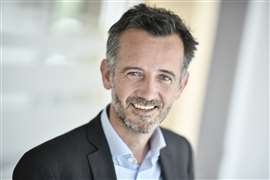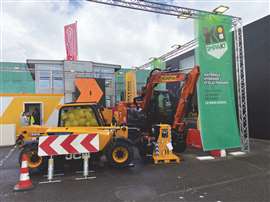Interview: Olivier Colleau on Kiloutou’s ‘stabilization phase’ and beyond
02 July 2024
Executive chairman of France-based renter Kiloutou talks M&A, growth prospects and the energy transition amid the challenges of today’s European market.
 Olivier Colleau, executive chairman, Kiloutou.
Olivier Colleau, executive chairman, Kiloutou.
Europe’s third-largest rental company, Kiloutou has been around for over 40 years, facing some of the most dynamic years in the industry. Today, the firms employs a team of 7,000, serving some 300,000 customers across over 660 branches.
To find out how the company is positioning itself within the European rental market, IRN spoke to Olivier Colleau. Here’s what he had to say.
IRN: How would you describe the current state of the French market?
OC: It would be a lie to say that the French market is booming. That is because the construction industry is clearly not in good health across subsegments.
New build is clearly not doing well, renovation and civil works are flattish. We know that we are in a cyclical market, so you have ups and downs, but now it sounds like we are in a down period.
The rental market is doing relatively well in this context. That is, if I look at the first months of this year, we are flat in comparison with the last year.
It’s likely that rental is doing better than the construction market in volume. Volume is slightly below last year, but since we increased prices to deal with inflation, we are more or less at the same level as last year in value terms.
When I look forward for the next few months, I clearly see and when discussing with customers that they don’t expect a magical recovery in the next quarter. It will probably be better or start to get better at the end of the year or in early 2025.
IRN: How would you say France compares to other areas Kiloutou are active in?
OC: In terms of total revenues, last year we recorded €1.2 billion revenue, and we are now less and less dependent upon France, although it still accounts for roughly 60% of the sales.
The remaining 40% is outside France, but still in Europe. We are present in seven countries within Europe and the market is not exactly the same.
The two countries where the demand is not exciting are France and Germany, and then other countries are doing better. For us it includes Southern Europe (Italy, Spain and Portugal), Poland and Denmark.
IRN: Can we expect Kiloutou to move into new markets, or is your focus on consolidating existing territories?
OC: First, we still have potential in France because even though we said that this year is not a good one for the business, growth will come back, and we still have an opportunity to grow in France.
Having said that, we will accelerate the international expansion. As I said, today international results are 40% and it’s likely that one day outside France will be bigger than the French business.
Before going into new geographies, we still have a lot to do in the countries where we are, because if you look at these countries, Germany is a very large market for the economy and construction, but also for rental. Italy is a large market. So is Spain. In these countries we have small market shares.
So, we still have a lot to do in these countries outside France, and then it’s likely that we will add new countries, but it will come later.
IRN: Will M&A continue to play a part in future growth?
OC: We’ve been doing acquisitions, but it’s a fact that we’ve also grown through organic growth by opening branches and expanding the existing branches.
When we enter a new country, we always start with an acquisition. The way Kiloutou is organized is highly decentralized because we know that customers are not the same across countries.
The habits are not the same, so we want to have local teams. Once we decide to go in any given country, we say, OK, let’s start with an acquisition of the right company.
Then, once in the country we activate all levers to grow. This includes acquisitions and organic growth.
We know that we are in a highly fragmented market. There are large companies, but there are plenty of small companies managed by an entrepreneur who set up the company that one day decides to sell. We are going to continue to make this type of acquisition.
IRN: How does Kiloutou plan to maintain recent growth?
OC: We have had pretty strong growth over the last two years. This year we will be more in the stabilization phase because of the market situation.
I still believe we will be growing this year despite the market, but it will not be double digit growth, it will be a stabilization, but sometimes it’s good to have stabilization because when you grow a lot it can put a lot of pressure on your organization.
Sometimes it’s good to say, let’s pause. Then if I look forward, I expect that construction will be back again in France and Germany, growth will continue with the same levels we have seen in the past that activated organic levers to open new depots, add new fleet in the branches and make smart acquisitions.
IRN: What is Kiloutou doing in terms of the energy transition and decarbonization?
OC: As a company, we are contributing by investing in low carbon fleet. For this year, roughly 1/3 of the motorised fleet we are going to buy will be low carbon, it’s quite a big amount and this will include electric equipment, while we are starting to buy some hydrogen units for generators.
We are also doing some actions for our own resources in terms of delivery trucks. We were the first company I think in Europe to buy 32 tons electric trucks, which is the big thing to deliver to our customers.
 The iMPAKT range from Kiloutou.
The iMPAKT range from Kiloutou.
Lastly, we try as far as we can to contribute to the overall actions of the ecosystem. We cannot act alone so we decided to create a community of the entire value chain, including manufacturers, rental companies and construction companies (denominated “Sustainable Fleet Community,” “Communauté des Acteurs du Matériel Durable” in French).
There are 10 companies at the foundation of this, including four manufacturers, four construction companies and two rental companies. The purpose of this is to align ourselves on a common roadmap, share best practices and work on common projects.
It goes beyond the usual boundaries of being competitors. We have a relationship between customers and suppliers, yes, but as far as carbon is concerned, we are not competitors. The only fight is against carbon and climate change.
So, we decided to say, let’s work together to share knowledge, to share the trajectory we have in terms of energy.
IRN: Are you still noting customers pushing back on electric due to price point?
OC: Yes, it is more expensive. It’s a fact that at the comparable product specifications the low carbon electric machine will be twice the price of the diesel machine. But despite this we need to invest, and we need to find the solution.
This is why as an industry need to communicate so that we can get some help towards this transition.
Let’s look at what happened in the car industry. The car industry is clearly advanced in comparison with the construction equipment industry.
They are driving towards decarbonization of cars, it’s a huge investment for them. Just remember that five or 10 years ago, an electric car was much more expensive than diesel cars.
Today the price is more or less the same because the various governments, and in particular the French government, gave subsidies to say, OK you want to buy an electric car, I will give you subsidies to compensate the difference between electric and diesel.
It helped and allowed manufacturers to have more volume and as they got more volume on their production lines they reduced the cost. I believe that we should follow the same trend.
STAY CONNECTED



Receive the information you need when you need it through our world-leading magazines, newsletters and daily briefings.
CONNECT WITH THE TEAM







